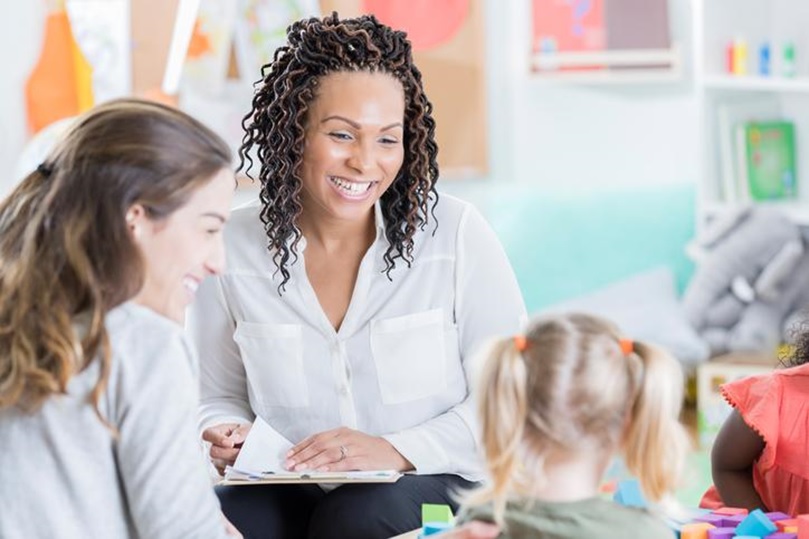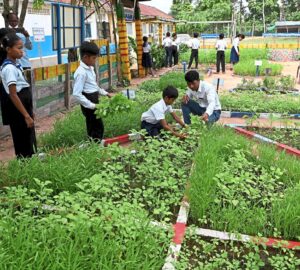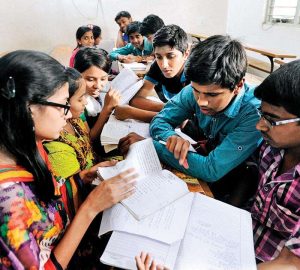A good parent-teacher relationship is essential for the growth and development of any student. But do you know all the benefits of establishing and maintaining such a relationship?
A good parent-teacher relationship can help create a positive learning environment where students feel supported, safe, and valued. When working together, parents and teachers can comprehensively understand the student’s needs, strengths, and weaknesses.
This collaboration allows for targeted support and interventions to help students achieve their full potential. Additionally, parents are more likely to take an active role in their child’s learning, leading to improved academic performance and overall well-being.
From increased communication to more understanding, these benefits ensure parents and teachers work together better for their student’s future. Read on to learn more and how to improve that at the school level as an educator.
Higher grades
One of the most significant benefits of having a good parent-teacher relationship is that it can lead to higher student grades.
When teachers and parents work together, they can create an atmosphere of encouragement and support that enables students to focus on their studies and stay on track with their goals.
As a result, students may be more likely to take advantage of learning opportunities and strive for excellence in their schoolwork.
Additionally, when parents and teachers are in regular communication, they can collaborate to ensure students are given clear expectations and have the resources they need to succeed in the classroom.
A positive parent-teacher relationship can foster an environment where students can reach their full academic potential.
Improved communication between parents and teachers
Good communication is vital to building a positive and productive parent-teacher relationship, as it allows for open dialogue, clarification of expectations, and trust. When parents and teachers communicate, it creates an environment of mutual respect and understanding that facilitates positive learning experiences for the student.
The benefits of improved communication between parents and teachers are numerous. First, it allows for better collaboration in creating individualized plans to help the student succeed. This action includes setting realistic goals, providing relevant feedback, and monitoring progress.
Additionally, improved communication can improve relationships between parents and children at home. When parents understand their child’s academic performance better, they can provide more support and guidance at home, leading to increased motivation and improved overall achievement.
Finally, improved communication between parents and teachers can foster a sense of trust and collaboration, leading to tremendous academic success for the student. This positive relationship can encourage students to take ownership of their learning and achieve immense success.
Easier identification of academic problems
When teachers and parents build a good relationship, they can better identify any academic problems the student may have. It can be anything from difficulty understanding concepts to bad grades in certain classes.
For example, if the teacher notices that a student is struggling with math more than other subjects, they can discuss this issue with their parents and devise a plan to help the child. Both parties can quickly address potential problems by tracking their performance regularly, improving overall school performance.
As earlier highlighted, an excellent parent-teacher relationship enables communication between the two, allowing them to talk openly about problems the student may be having. The teacher can provide insight into why the student may be struggling and suggest strategies for overcoming those difficulties.
Parents can also gain insights into their child’s learning styles and how to support them better at home. The child could, for example, find homeschooling more congenial among many other benefits. Having this kind of information early on can help address any issues before they become too severe.
Greater motivation to learn
An excellent parent teacher relationship can serve as motivation for students to learn. This is because the teacher is more invested in the student’s progress and success and is more willing to offer guidance and support when needed.
Additionally, when students feel that their parents are actively involved in their education, they are more likely to take their studies seriously and make the necessary effort. They understand that their hard work and dedication will benefit them and those who care about them.
For instance, having parents or guardians attend events such as parent-teacher meetings, school functions, and special activities can show the child how much their parents value their education.
The presence of supportive parents at these functions can send a strong message to the child regarding how significant their schooling is. Thus, students will be more motivated to learn and strive for excellence.
Increased sense of responsibility
When parents and teachers are actively involved in a child’s education, it can inculcate a sense of responsibility in the student. When parents and teachers create a supportive environment where each adult works together to ensure the student’s success, the student takes ownership of their learning.
A sense of responsibility can be instilled when the student knows that their teacher and parents are actively engaged in their education and have high expectations for their academic success. This allows students to take control of their learning and become more self-motivated.
Building an excellent parent-teacher relationship fosters an environment that encourages responsibility on the part of the student. The result? A strong work ethic and internal drive to succeed.
You can learn these skills as an educator by pursuing an online master’s in education UK program at the University of Exeter. Their program will equip you with the knowledge to foster successful relationships with parents and students.
Upon graduation, you’ll have the tools necessary to encourage effective communication between yourself, parents, and students, which is essential to creating a positive classroom atmosphere.
Improved organizational skills
When parents and teachers can collaborate and work together, it helps the student develop better organizational skills. This claim is valid because the student encounters different methods and resources used by both the parent and teacher to ensure the successful completion of tasks.
Students will learn to plan and organize their work, prioritize tasks, and manage their time efficiently. For example, suppose the student’s parents explain that they need help organizing their notes to understand the material better.
In that case, the teacher can provide tools to help make this process easier. If the student needs help developing study habits that work for them, the teacher can offer advice or resources on this topic.
When students receive guidance from both the parent and teacher, they can develop a better sense of organization and responsibility. This action will help them stay on track with schoolwork and other activities, thus improving their academic performance.
Earlier recognition of health or psychological problems
When parents and teachers have a good relationship, it can help to identify potential health or psychological problems much earlier. It can be difficult to spot changes in a student’s behavior that could indicate a problem.
But when there is a good relationship between parent and teacher, they can work together to detect these issues earlier and get the help the student needs. This can improve the child’s overall well-being and prevent any long-term problems from developing.
Sometimes, it can even stop a severe problem from worsening. Good communication between the two parties means that any physical, mental, or emotional issues are identified quickly so the student can receive the best support.
Additionally, this kind of cooperation encourages mutual trust and understanding between both sides. Parents can feel confident knowing their child’s teacher has their best interests at heart, while teachers know their student’s parents want them to succeed.
Increased participation in extracurricular activities
When parents and teachers collaborate to build a strong relationship, the student is more likely to participate in extracurricular activities. Parents can provide information on the student’s interests by creating an open dialogue.
As a result, the teacher can act as a mentor and help them select an activity that best suits their needs. The teacher’s advice and guidance give the student the confidence to engage in activities outside the classroom and gain real-world experience.
Furthermore, when parents and teachers communicate regularly, it can help motivate students to take part in extracurricular activities like sports, music, drama, and more. For example, if the student struggles with math, the parent may encourage them to join a mathematics club, which could help improve their problem-solving skills.
A teacher may also have insight into a particular subject area or activity that can benefit the student, such as volunteer work or internships.
This helps students develop and hone new skills, discover hidden talents, and gain real-world experience. In the long run, students can apply the experiences to their future endeavors, giving them an edge over their peers.
How educators can improve the parent-teacher relationship at school level
To maximize the success of their students, educators must build strong relationships with their student’s parents. The parent-teacher relationship can make or break a student’s academic performance, social development, and overall well-being. Here are some ways educators may leverage to improve this.
Communicate openly and frequently
The parent-teacher relationship is integral to a child’s academic success, and educators must ensure that parents are involved and informed. Open communication is vital to fostering a positive and productive relationship with parents.
One of the best ways to create an open line of communication is to hold regular meetings with parents to discuss their child’s progress. These meetings should include formal and informal updates about a student’s performance in class and any strategies for improvement or rewards for success.
Educators should also ensure parents can access their contact information to reach out if they have questions or concerns. Email, text messages, and other forms of digital communication can be great ways to stay in touch.
Get to know the parents
Building trust with parents begins with getting to know them. Educators should take the time to learn about the students’ families and their hopes, values, and expectations for their child’s education.
Parents should feel like a part of their child’s educational team and that their opinions are valued.
Educators can start by making an effort to introduce themselves and shake hands with the parents when they arrive at school for events or meetings. They should be available to answer any questions or address parents’ concerns.
Keep parents updated
Another essential element in building a solid parent-teacher relationship is to keep parents updated on their child’s progress and development. There are many ways educators can do this.
The first and most basic is to send out regular report cards and assessments. These documents provide parents with the most up-to-date information about their child’s academic performance and allow them to discuss any areas of concern with the teacher.
In addition, educators can also use digital tools such as emails, text messages, or online learning platforms to communicate with parents. This allows parents to stay updated on their child’s progress, ask questions, and provide feedback.
Encourage parent involvement
Parent involvement is one of the critical factors in successful education. Educators can foster this bond by encouraging parents to participate actively in their children’s learning.
It can include attending school meetings, participating in activities such as Open House, and volunteering in classrooms. Educators can also facilitate meaningful communication between parents and students, allowing parents to observe their child’s learning.
Teachers can also encourage parents to become actively involved in their child’s education by assigning tasks requiring support from the parents. These activities include reading a book with their child or helping them complete an assignment.
Final thoughts
Building a solid parent-teacher relationship is essential to student growth. Parents play a crucial role in providing the support and encouragement necessary for students to reach their fullest potential.
When parents and teachers work together, they can create an environment where students feel empowered, supported, and motivated to reach their goals. The positive impact of fostering an open line of communication can be seen in higher grades, increased motivation, enhanced social skills, and improved behavior.
Establishing rapport with parents and teachers can make the school experience more enjoyable for students and promote learning. By working together and supporting each other, parents and teachers can ensure that students reach their full potential.




